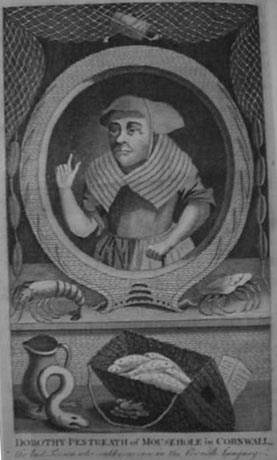
Dorothy Pentreath of Mousehole
in Cornwall,
the last Person who could converse in the Cornish language.
The Old Woman of Mousehole : Excerpts from Avram Davidson's letters to
Reno Odlin
March 12/91
[. . .] One hesitates to say about Cornish. Despite all the talk
about Truganini ("Queen Truganini"!) it has long been clear to me that
she was not The Last of the Tasmanians, being survived by another such
(woman) on Kangaroo Island, SA; but Peter Conrad's bopo that should be
b o o k, but bopo is rather nice, don't you say? says that not only
was there another one in Tasmania who lived into the 19-zeroes but that
she also made a phonograph record, of songs, chants, in her otherwise extinct
language. Not to forget about Cornish — I am sure we face a revival here.
I had not thought enough remained on which to base a revival, though was
surprised to see in the UCI Library a book contain[in]g the texts of two
plays in Cornish. There was, I now recall, an anyway attempted revival
of Cornish Nationalism ("Dylan Thomas, asked what he thought of Welsh Nationalism,
replied in three words, two of which were 'Welsh Nationalism.'") perhaps
30 yrs ago. A sort of Pretend Parliament convened, calling itself The Stannaries
— which ignorant Me had thought meant Tin Mines — and "repealing" any/every
laws pertain[in]g to Cornwall since 1790. As for Mrs Dolly whataname, supposedly
the last Cornish speaker, evidently her totality of Cornish speech consisted
of saying her prayers therein. And I suppose the lega[l] need to translate
all the laws passed by the House of Keys into Manx has kept that somewhat
alive, e'enthough as G. C. Edmondson reprts that "Nobody speaks it at home."
I have heard nothing further in years about the one tiny remote Egyptian
village where Coptic is said to survive, nor about the 20 young Coptic
couples in Metropolitan Egypt who'd sworn to speak no tongue other than
Coptic. The last tidings of the one or two villages where the Western Aramaic
survives were getting but no help what all from the Govt of Syria, which
had established a large army encampment there. [. . .]
April 2/91
[. . .] Thanks also for the Cornish xerox from the WSJ. Fascinating.
But let's get this straight: WS[J] does not say, great authority that it
is, that "Dolly Pentraeth's last words, in Cornish, were: "I will not speak
English — you ugly black toad!" but that "In her last days … she gave vent
to a few well-chosen words of Cornish …'" blah blah blah. Maybe. [. . .]
The Cornish tongue
Cornish is one of the Brythonic dialects of Gaelic and is thus related
to Welsh and Breton ; J. Loth, in his Chresthomathie bretonne (1890)
maintains that Cornish and Breton speakers could have understood one another
as late as 1600 ; the Reformation hastened the decline of Cornish, for
Christian prayer-books and scriptures were not translated into the vernacular.
By the late seventeenth century, the language was spoken only in the western
parts of the duchy, and few children could speak it. Half a century
later, only a very few individuals between Penzance and Land's End knew
the language. Dorothy (whose first name is sometimes recorded as Dolly)
Pentreath died in 1777 ; H. Jenner (Handbook of the Cornish Language,
1904)
seems, however, to state that there were others who could speak the language
who lived on into the middle of the nineteenth century.
This illustration comes from an extra-illustrated edition of the Works
of Peter Pindar (circa 1825).
[Back to the Gallery]
